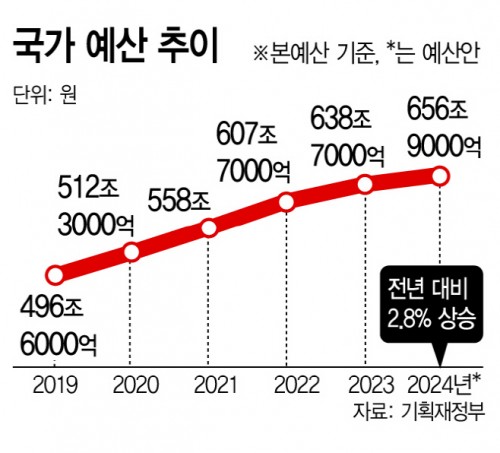 |
AsiaToday reporter Lee Ji-hoon
The government proposed a budget of 656.9 trillion won ($495 billion) for 2024, which represents 2.8 percent growth from the amount allocated for this year. It marks the lowest on-year rise since 2005. Considering last year’s growth rate of 5.2 percent and this year’s consideration rate, it can be considered as a “budget cut.” The government’s smallest increase in its budget proposal illustrates its commitment to improving fiscal soundness that has weakened due to the previous Moon Jae-in government’s expansionary policy. However, the government has made bold investments in areas where finances are essential, such as support for the vulnerable, by scaling down multiple projects worth 23 trillion won that are regarded as being inefficient.
The budget proposal was endorsed at a Cabinet meeting on Tuesday presided over by President Yoon Suk-yeol.
“The budget increased by 2.8 percent, the smallest rate of growth since 2005,” Yoon said, confirming next year’s budget at the meeting. “The government has made a complete transition to a policy of improving fiscal soundness, while strongly rejecting the reckless expansionary policy of the previous government.”
The 2.8 percent growth in total spending for next year is the lowest in 18 years since 2005 when fiscal statistics were compiled. It is one-third of the roughly seven- to nine-percent growth during the Moon Jae-in administration, as the government pursues belt-tightening measures to improve fiscal health.
On the other hand, spending restructuring worth 23 trillion won will be carried out, continuing the intensive fiscal restructuring of over 20 trillion won for the second consecutive year following last year’s expenditure cut of 24 trillion won. The financial resources raised through restructuring will be boldly invested in areas that are essential, such as welfare for the weak and job creation.
“The budget spending will be focused on realizing the core state functions, such as welfare for the weak, national defense and law and order, as well as securing growth engines that can create quality jobs,” Yoon said.
However, some are concerned that if the government’s fiscal execution is reduced, its ability to respond to economic uncertainties could weaken.
In response, Deputy Prime Minister and Minister of Economy and Finance Choo Kyung-ho said that the “reckless management of the national budget will deteriorate our external fiscal credibility, while burdening the future generation excessively, especially at a time of challenges to fiscal health.”
#budget #2024 #lowest increase #belt-tightening
Copyright by Asiatoday
Most Read
-
1
-
2
-
3
-
4
-
5
-
6
-
7





















